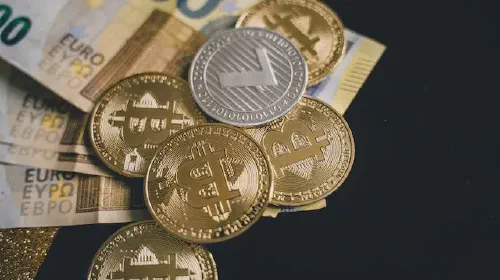What Is An Nft (Non-Fungible Token) And How Does It Work?
Salomon Kisters
Aug 10, 2023This post may contain affiliate links. If you use these links to buy something we may earn a commission. Thanks!
The world of blockchain technology has introduced us to various innovative concepts and applications.
One of the most recent and buzzworthy trends in the blockchain space is the rise of Non-Fungible Tokens (NFTs).
Perhaps you’ve heard about NFTs in the news or on social media, but you might be wondering what they actually are and how they work.
In this blog post, we will delve into the details of NFTs, explore their unique characteristics, and understand their underlying technology.
So, let’s dive in!
Understanding Fungibility and Non-Fungibility
Before we explore NFTs, let’s first understand the concept of fungibility. In the world of finance, fungibility refers to the interchangeable nature of assets. For example, if you have two one-dollar bills, they are essentially the same, and you can trade one for another without any difference in value. This is because currency notes are fungible by nature.
On the other hand, non-fungible assets are unique and cannot be exchanged on a one-to-one basis. Each item has its own distinct value and characteristics. For instance, a house, a rare painting, or a collectible card, all possess unique attributes that differentiate them from one another.
Introducing Non-Fungible Tokens (NFTs)
Non-Fungible Tokens, commonly known as NFTs, are digital assets that use blockchain technology to certify their scarcity, ownership, and provenance. Unlike cryptocurrencies such as Bitcoin or Ethereum, which are fungible tokens, each NFT is one-of-a-kind and cannot be replaced by another token of the same value. This uniqueness is what makes NFTs special and enables them to represent ownership of digital or physical assets in the digital realm.
The Technology Behind NFTs
NFTs are built on blockchain networks, primarily utilizing Ethereum’s blockchain due to its flexibility and smart contract capabilities. Ethereum, as a decentralized platform, provides a suitable infrastructure for creating and managing NFTs through a specific standard called ERC-721.
Smart contracts, which are self-executing contracts with predefined rules and conditions, play a crucial role in the functioning of NFTs. They contain all the information about the ownership, characteristics, and history of an NFT, making it possible to verify its authenticity and transferability securely.
NFT Characteristics and Ownership
One of the key features of NFTs is their ability to represent ownership of unique assets. When you own an NFT, you hold the cryptographic proof of your ownership, which is recorded on the blockchain. This ownership can be transferred to another individual through a peer-to-peer transaction, with the details of the transfer being immutably recorded on the blockchain. This means that the ownership history of an NFT can be easily traced back to its original creator.
Additionally, NFTs can have attributes and metadata associated with them, such as descriptions, images, audio, or video files. These attributes enhance the value and utility of the NFT, making it more than just a digital collectible.
The Use Cases of NFTs
NFTs have gained significant attention due to their versatility and potential applications. While digital art and collectibles, such as virtual trading cards and virtual land, have dominated the NFT market, the use cases extend far beyond that.
One interesting application is tokenizing real-world assets, including real estate, luxury goods, or even intellectual property rights. By representing these assets as NFTs, it becomes easier to track ownership, transfer ownership securely, and potentially unlock liquidity by fractionalizing ownership.
Furthermore, NFTs offer new possibilities for creators and artists to monetize digital content. Musicians can sell limited edition albums or concert tickets as NFTs, providing additional revenue streams and direct engagement with fans. Similarly, writers, photographers, and other content creators can tokenize their work, granting buyers exclusive rights or access to unique experiences.
Conclusion
Non-Fungible Tokens (NFTs) have emerged as a groundbreaking technology, revolutionizing the way we perceive ownership and value in the digital realm. Their unique characteristics and the underlying technology of blockchain have opened up endless opportunities for individuals and industries alike. From digital art to tokenizing real-world assets, NFTs are pushing the boundaries of what is possible in the digital space.
As the NFT market continues to evolve, it is essential to stay informed and discerning, ensuring that you fully understand the assets you are acquiring or trading. The world of NFTs is still relatively new, and with new innovations and standards emerging, it is an exciting time to explore and engage with this transformative technology. So, embrace the world of NFTs and unlock the potential of digital ownership!
Stay informed with the latest insights in Crypto, Blockchain, and Cyber-Security! Subscribe to our newsletter now to receive exclusive updates, expert analyses, and current developments directly to your inbox. Don't miss the opportunity to expand your knowledge and stay up-to-date.
Love what you're reading? Subscribe for top stories in Crypto, Blockchain, and Cyber-Security. Stay informed with exclusive updates.
Please note that the Content may have been generated with the Help of AI. The editorial content of OriginStamp AG does not constitute a recommendation for investment or purchase advice. In principle, an investment can also lead to a total loss. Therefore, please seek advice before making an investment decision.

Top Alternative Cryptocurrency Projects to Mine After Ethereum 2.0 Merge
Discover the top alternative cryptocurrency projects to mine after the Ethereum 2.0 merge. Explore Ethereum Classic, EthereumPoW, Neoxa, Ravencoin, Æternity, and Ergo.

Phishing Attacks - How to Recognize and Avoid Them
Learn how to protect yourself against phishing attacks by recognizing and avoiding them. Our expert guide provides valuable tips and insights to help keep you safe online.

Polygon vs. Ethereum: Key Differences Explained | SEO Blog
Learn about the key differences between Polygon and Ethereum, two prominent Proof-of-Stake networks enabling DeFi trading and NFT interactions.
Protect your documents
Your gateway to unforgeable data. Imprint the authenticity of your information with our blockchain timestamp